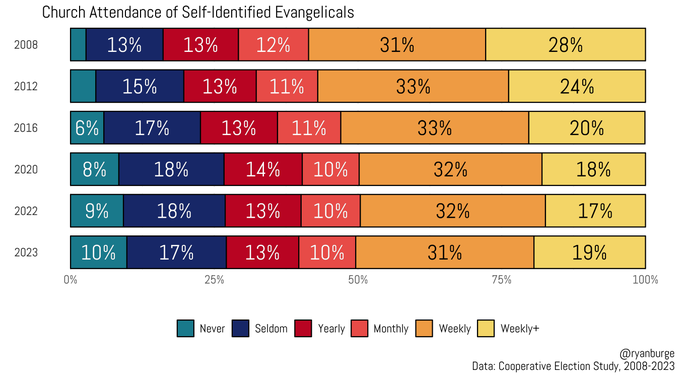Jews have regarded their Jewishness as a cultural identity more than a religious one for decades now. This was somewhat elective, somewhat forced on them by Christians over time. Christian did take on the meaning of not-Jewish in Europe centuries ago, though this was often in the context of people who did have Christian observance as well. This bled over into North America as well, though not as strongly.
This happened with American Catholics as well, or at least, with the Irish Catholics around here. Catholic was an identity even when it was no longer a held faith. Come to think of it, that happened even more strongly in Ireland itself - I was just there but it didn't come to mind immediately.
There is something of this among smaller and culturally distinct groups like Mormons or Mennonites. Perhaps it is as strongly felt among them, just not so widespread as to be noticed much by the rest of us. Garrison Keillor joked about the Midwestern cultural tendency of Lutherans to see themselves in this way. "When you become an atheist in Minnesota, it is a Lutheran God that you don't believe in." (He himself grew up Brethren, and was thus something of an observer to the larger Lutheran & Catholic religious environment.)
Now it has happened to Evangelicals, which shows the shifting nature of these things. 40% now go to church yearly or less. Yet this is a category that changed in meaning to come into prominence in my adulthood, or at least in my lifetime. Earlier in the 20th C, Lutherans and Presbyterians called themselves Evangelical, meaning "proclaiming" churches. It still showed up in names of churches and titles of their organisations. But it became more associated with evangelis-ing churches and movements, born-again Christians.
They started flexing their muscles culturally leading up to Jimmy Carter running and wearing his faith prominently, but still stressed strict observance of things like church attendance. Ronald Reagan did not fit that evangelical model nearly as well, but he either naturally or tactically stressed the simple faith model, and the evangelicals grew more comfortable with moving into the politically conservative camp. Church attendance as a whole did not drop off that much, but shifted away from the mainstream denominations to "Christian Culture" ones. They built schools, starting with kindergartens but eventually moving on to K-12. There was some church-like-the-old-days aspects that were cultural or political as much as doctrinal, but they held to doctrine that the mainstreamers were easing away from as well. We were Lutherans until 1986, and Sunday School included people who had very odd ideas about the Trinity, and Other Gods began to be added in as interesting. The Native American spirituality at church camp was something of a final straw for us and we moved to the Evangelical Covenant Church.
The larger Christian Culture was never much mine, even though most of my best friends were in it and my children went to school in it. But the mainstream and secular cultures were also not mine, and you have to sleep somewhere.
Looking at the graph again, it does have that feeling of every level of participation slowly changing, not people switching positions. Maybe I'm wrong on that. Maybe there is a serious contingent of people who used to attend weekly in 2008 but don't go at all now. There has always been some of that - when you pay as much attention to who is worshiping with you as my wife does you become aware of people who no longer come. I remember that as far back as the 80s in this congregation, and it was painfully obvious in the small startup church we were part of 1996-2010. But maybe there has been a sharp increase in hard switches. But the more likely explanation is that there is a tendency toward less participation among everyone.
It seems to coincide with even evangelicals having fewer children. The children in the Christian culture grew up and moved out, and their parents now longer have the youth group, choir, and Sunday School attendance drivers in their own lives and so stay home a bit more. There may be some connection, though disentangling that is beyond me.

1 comment:
I wonder if some of the shift at the high end is due to restructuring in the churches. For example "Sunday School" and "Training Union" and "Prayer meeting" are to some extent offloaded into small groups and other prayer meetings, which may or may not meet at the building. This might partly explain the Weekly+ dropping by a third.
Post a Comment